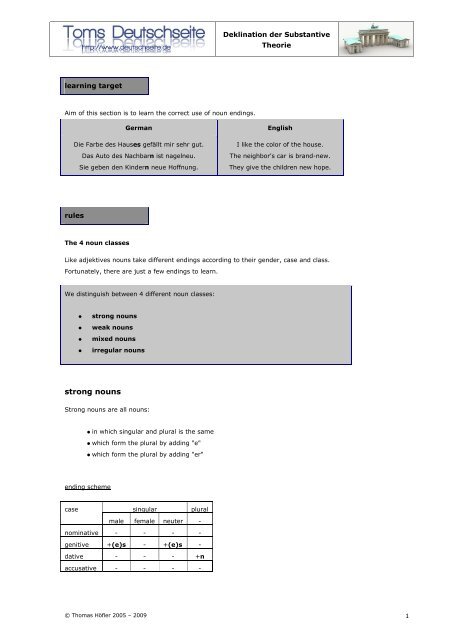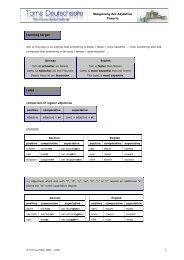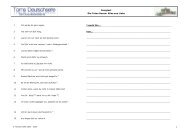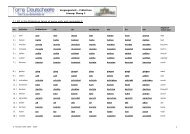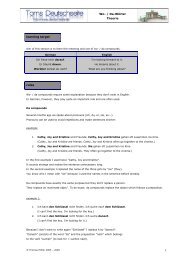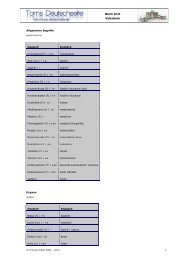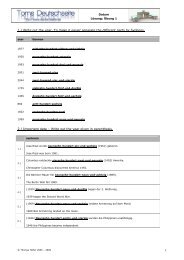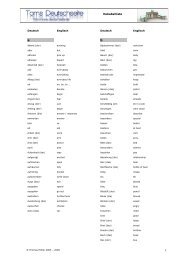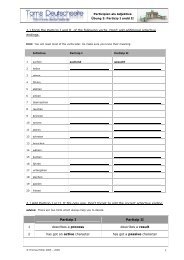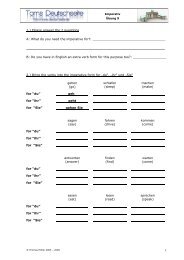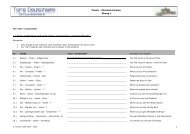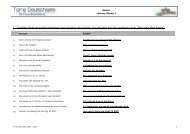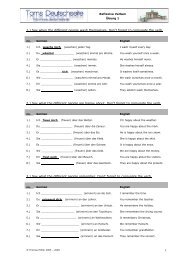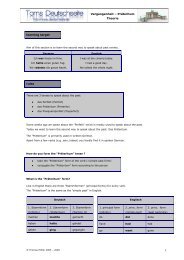Deklination der Substantive
Deklination der Substantive
Deklination der Substantive
You also want an ePaper? Increase the reach of your titles
YUMPU automatically turns print PDFs into web optimized ePapers that Google loves.
learning target<br />
Aim of this section is to learn the correct use of noun endings.<br />
<strong>Deklination</strong> <strong>der</strong> <strong>Substantive</strong><br />
Theorie<br />
German English<br />
Die Farbe des Hauses gefällt mir sehr gut.<br />
rules<br />
Das Auto des Nachbarn ist nagelneu.<br />
Sie geben den Kin<strong>der</strong>n neue Hoffnung.<br />
The 4 noun classes<br />
I like the color of the house.<br />
The neighbor's car is brand-new.<br />
They give the children new hope.<br />
Like adjektives nouns take different endings according to their gen<strong>der</strong>, case and class.<br />
Fortunately, there are just a few endings to learn.<br />
We distinguish between 4 different noun classes:<br />
• strong nouns<br />
• weak nouns<br />
• mixed nouns<br />
• irregular nouns<br />
strong nouns<br />
Strong nouns are all nouns:<br />
• in which singular and plural is the same<br />
• which form the plural by adding "e"<br />
• which form the plural by adding "er"<br />
ending scheme<br />
case<br />
singular plural<br />
male female neuter -<br />
nominative - - - -<br />
genitive +(e)s - +(e)s -<br />
dative - - - +n<br />
accusative - - - -<br />
© Thomas Höfler 2005 – 2009 1
examples:<br />
<strong>Deklination</strong> <strong>der</strong> <strong>Substantive</strong><br />
Theorie<br />
• Der Mann kauft ein Buch. (The man buys a book.) [nominative, male, singular]<br />
• Die Frau des Mannes ist Ärztin. (The husband's wife is a doctor.) [genitive, male, singular]<br />
• Das Kind isst ein Eis. (The child eats ice cream.) [nominative, neuter, singluar]<br />
• Das Spielzeug des Kindes ist kaputt. (The child's toy is damaged.) [genitive, neuter, singular]<br />
• Die Männer bauen ein Haus. (The men are building a house.) [nominative, plural]<br />
• Ich bringe den Männern etwas zu essen. (I bring something to eat to the men.) [dative, plural]<br />
ending "s" or "es"?<br />
Strong male/neuter nouns have either a "s" or "es" as ending in the gentive case:<br />
• Nouns with 1 syllable and all nouns which end with s, ß, z, x, t or d: add "es"<br />
• All other nouns with more than one syllable: add "s"<br />
examples:<br />
• <strong>der</strong> Mann (one syllable) => des Mannes<br />
• das Bad (one syllable, ends with d) => des Bades<br />
• das Gesetz (two syllables, ends with z) => des Gesetzes<br />
• <strong>der</strong> Vater (two syllables) => des Vaters<br />
• <strong>der</strong> Fernseher (three syllables) => des Fernsehers<br />
behaviour of loan words<br />
Some loan words from other languages are a kind of subclass of the strong nouns.<br />
To this group belong all nouns which form the plural by adding "s".<br />
They behave in the singluar like "normal" strong verbs but don't get an additional "n" in the dative plural.<br />
example ending scheme:<br />
case singular plural<br />
nominative das Auto die Autos<br />
genitive des Autos <strong>der</strong> Autos<br />
dative dem Auto den Autos<br />
accusative das Auto die Autos<br />
© Thomas Höfler 2005 – 2009 2
other loan words:<br />
<strong>der</strong> Park<br />
(the park)<br />
<strong>der</strong> Krimi<br />
(the crime story)<br />
<strong>der</strong> Job<br />
(the job)<br />
weak nouns<br />
Weak nouns are:<br />
das Kino<br />
(the cinema)<br />
<strong>der</strong> Onkel<br />
(the uncle)<br />
das Auto<br />
(the car)<br />
• almost all female nouns<br />
das Taxi<br />
(the taxi)<br />
das Radio<br />
(the radio)<br />
das Café<br />
(the café)<br />
<strong>Deklination</strong> <strong>der</strong> <strong>Substantive</strong><br />
Theorie<br />
• all male nouns which form the plural by adding (e)n (see below for more details)<br />
• neuter weak nouns don't exist<br />
ending scheme<br />
case<br />
singular plural<br />
male female neuter -<br />
nominative - - - -<br />
genitive +(e)n - - -<br />
dative +(e)n - - -<br />
accusative +(e)n - - -<br />
The declination of weak nouns is also called n-declination<br />
since you have to add (e)n to the male nouns in all cases except from nominative.<br />
examples:<br />
• Der Junge geht in die Schule. (The boy goes to school.) [nominative, male, singular]<br />
• Ich kenne die Mutter des Jungen. (I know the boy's mother.) [genitive, male, singular]<br />
• Ich gebe dem Jungen ein Buch. (I give a book to the boy.) [dative, male, singular]<br />
• Sie begrüßt den Jungen. (She welcomes the boy.) [accusative, male, singular]<br />
© Thomas Höfler 2005 – 2009 3
Which male nouns are weak?<br />
Male nouns which end with "e".<br />
These are mostly male living beings.<br />
examples:<br />
<strong>der</strong> Junge<br />
(the boy)<br />
<strong>der</strong> Löwe<br />
(the lion)<br />
<strong>der</strong> Kunde<br />
(the customer)<br />
<strong>der</strong> Beamte<br />
(the clerk)<br />
<strong>der</strong> Riese<br />
(the giant)<br />
<strong>der</strong> Heilige<br />
(the saint)<br />
<strong>der</strong> Erbe<br />
(the inheritor)<br />
exception:<br />
<strong>der</strong> Käse<br />
(the cheese)<br />
<strong>der</strong> Neffe<br />
(the nephew)<br />
<strong>der</strong> Affe<br />
(the monkey)<br />
<strong>der</strong> Kollege<br />
(the colleague)<br />
<strong>der</strong> Erwachsene<br />
(the adult)<br />
<strong>der</strong> Drache<br />
(the dragon)<br />
<strong>der</strong> Zeuge<br />
(the witness)<br />
<strong>der</strong> Bube<br />
(the jack)<br />
Male nouns which used to end with "e".<br />
examples:<br />
<strong>der</strong> Held<br />
(the hero)<br />
<strong>der</strong> Graf<br />
(the count)<br />
<strong>der</strong> Geck<br />
(the fop)<br />
<strong>der</strong> Fink<br />
(the finch)<br />
<strong>der</strong> Narr<br />
(the fool)<br />
<strong>der</strong> Mensch<br />
(the human)<br />
<strong>der</strong> Fürst<br />
(the ruler)<br />
<strong>der</strong> Bauer<br />
(the farmer)<br />
<strong>der</strong> Spatz<br />
(the sparrow)<br />
<strong>der</strong> Tor<br />
(the sap)<br />
<strong>Deklination</strong> <strong>der</strong> <strong>Substantive</strong><br />
Theorie<br />
<strong>der</strong> Verwandte<br />
(the relative)<br />
<strong>der</strong> Hase<br />
(the rabbit)<br />
<strong>der</strong> Fremde<br />
(the stranger)<br />
<strong>der</strong> Verlobte<br />
(the fiancé)<br />
<strong>der</strong> Gatte<br />
(the spouse)<br />
<strong>der</strong> Süchtige<br />
(the addict)<br />
<strong>der</strong> Rivale<br />
(the conten<strong>der</strong>)<br />
<strong>der</strong> Nachbar<br />
(the neighbor)<br />
<strong>der</strong> Prinz<br />
(the prince)<br />
<strong>der</strong> Bär<br />
(the bear)<br />
<strong>der</strong> Ochs<br />
(the ox)<br />
<strong>der</strong> Hirt<br />
(the herdsman)<br />
© Thomas Höfler 2005 – 2009 4
Male nouns from Greek or other foreign languages<br />
The following endings are indicator for these words:<br />
• -ant<br />
• -ent<br />
• -ist<br />
• -oge<br />
examples:<br />
<strong>der</strong> Student<br />
(the student)<br />
<strong>der</strong> Soldat<br />
(the soldier)<br />
<strong>der</strong> Architekt<br />
(the architect)<br />
<strong>der</strong> Assistent<br />
(the assistant)<br />
<strong>der</strong> Diplomat<br />
(the diplomat)<br />
<strong>der</strong> Philosoph<br />
(the philosopher)<br />
<strong>der</strong> Tourist<br />
(the tourist)<br />
<strong>der</strong> Präsident<br />
(the president)<br />
<strong>der</strong> Elephant<br />
(the elephant)<br />
<strong>der</strong> Lieferant<br />
(the deliveryman)<br />
<strong>der</strong> Dozent<br />
(the lecturer)<br />
<strong>der</strong> Christ<br />
(the Christ)<br />
some nationalities / races and culture names<br />
examples:<br />
<strong>der</strong> Deutsche<br />
(the German)<br />
<strong>der</strong> Franzose<br />
(the Frenchman)<br />
<strong>der</strong> Schwede<br />
(the Swede)<br />
<strong>der</strong> Bayer<br />
(the Bavarian)<br />
<strong>der</strong> Russe<br />
(the Russian)<br />
<strong>der</strong> Däne<br />
(the Dane)<br />
<strong>der</strong> Türke<br />
(the Turk)<br />
<strong>der</strong> Sachse<br />
(the Saxon)<br />
<strong>Deklination</strong> <strong>der</strong> <strong>Substantive</strong><br />
Theorie<br />
<strong>der</strong> Polizist<br />
(the police officer)<br />
<strong>der</strong> Agent<br />
(the agent)<br />
<strong>der</strong> Patient<br />
(the patient)<br />
<strong>der</strong> Terrorist<br />
(the terrorist)<br />
<strong>der</strong> Paragraph<br />
(the paragraph)<br />
<strong>der</strong> Kamerad<br />
(the companion)<br />
<strong>der</strong> Brite<br />
(the Briton)<br />
<strong>der</strong> Chinese<br />
(the Chinese)<br />
<strong>der</strong> Pole<br />
(the Pole)<br />
<strong>der</strong> Preuße<br />
(the Prussian)<br />
© Thomas Höfler 2005 – 2009 5
some (technic) terms<br />
examples:<br />
<strong>der</strong> Automat<br />
(the automat)<br />
<strong>der</strong> Planet<br />
(the planet)<br />
<strong>der</strong> Herr<br />
<strong>der</strong> Telegraph<br />
(the telegraph)<br />
<strong>der</strong> Diamant<br />
(the diamond)<br />
<strong>Deklination</strong> <strong>der</strong> <strong>Substantive</strong><br />
Theorie<br />
<strong>der</strong> Satellit<br />
(the satellite)<br />
<strong>der</strong> Komet<br />
(the comet)<br />
Der Herr (=Mr) is a little exception since you just have to add "n"<br />
in the genitive, dative and accusative (singular) and not "en" as usually.<br />
case singular plural<br />
nominative <strong>der</strong> Herr die Herren<br />
genitive des Herrn <strong>der</strong> Herren<br />
dative dem Herrn den Herren<br />
accusative den Herrn die Herren<br />
mixed nouns<br />
Mixed nouns behave like strong and weak nouns.<br />
They add (e)s in the genitive case of male and neuter nouns (=strong noun behaviour)<br />
but form the plural by adding (e)n (=weak noun behaviour).<br />
ending scheme<br />
case<br />
singular plural<br />
male female neuter -<br />
nominative - - - -<br />
genitive +(e)s - +(e)s -<br />
dative - - - -<br />
accusative - - - -<br />
examples:<br />
• Der Professor kann sehr gut erklären. (The professor can explain very well.) [nominative, male,<br />
singular]<br />
• Der Name des Professors ist sehr lustig. (The professor's name is very funny.) [genitive, male,<br />
singular]<br />
• Die Professoren kommen aus den USA. (The professors come from the USA.) [nominative, plural]<br />
© Thomas Höfler 2005 – 2009 6
examples:<br />
<strong>der</strong> Staat<br />
(the<br />
country)<br />
<strong>der</strong> See<br />
(the lake)<br />
irregular nouns<br />
<strong>der</strong> Direktor<br />
(the<br />
headmaster)<br />
<strong>der</strong> Mast<br />
(the pylon)<br />
<strong>der</strong> Schmerz<br />
(the pain)<br />
<strong>der</strong> Vetter<br />
(the cousin)<br />
<strong>Deklination</strong> <strong>der</strong> <strong>Substantive</strong><br />
Theorie<br />
<strong>der</strong> Motor<br />
(the engine)<br />
das Drama<br />
(the drama)<br />
das Ohr<br />
(the ear)<br />
das Bett<br />
(the bed)<br />
There are just a few irregular nouns. They form the plural by adding (e)n (=weak noun behaviour)<br />
and add (e)n in genitive, dative and accusative case of male nouns (=weak noun behaviour).<br />
What distigiush them from weak nouns is that they add an additional "s" in the genitive case<br />
and the neuter noun (only one: das Herz) behaves similar.<br />
ending scheme<br />
case<br />
singular plural<br />
male female neuter -<br />
nominative - - - -<br />
genitive +(e)ns - +(e)ns -<br />
dative +(e)n - +(e)n -<br />
accusative +(e)n - - -<br />
examples:<br />
• Der Name ist lang. (The name is long.) [nominative, male, singular]<br />
das Ende<br />
(the end)<br />
das Auge<br />
(the eye)<br />
• Die Aussprache des Namens ist schwierig. (The pronouncation of the name is difficult.) [genitive,<br />
male, singular]<br />
• Sie sagt mir den Namen ihres Exfreundes. (She tells me her ex boyfriend's name.) [dative, male,<br />
singular]<br />
• Ich kann mir all diese Namen nicht merken. (I can't remember all these names.) [accusative, plural]<br />
• Das Herz ist groß. (The heart is big.) [nominative, neuter, singular]<br />
• Die Farbe des Herzens ist rot. (The color of the heart is red.) [genitive, neuter, singular]<br />
• Sie geben dem Herzen noch ein Jahr. (They give the heart one more year.) [dative, neuter,<br />
singular]<br />
• Die Herzen sehen gleich aus. (The hearts look the same.) [nominative, plural]<br />
all irregular nouns:<br />
<strong>der</strong> Name<br />
(the name)<br />
<strong>der</strong> Wille<br />
(the will)<br />
<strong>der</strong> Gedanke<br />
(the thought)<br />
<strong>der</strong> Glaube<br />
(the faith)<br />
<strong>der</strong> Buchstabe<br />
(the letter)<br />
<strong>der</strong> Friede<br />
(the peace)<br />
<strong>der</strong> Funke<br />
(the spark<br />
das Herz<br />
(the heart)<br />
© Thomas Höfler 2005 – 2009 7
summary<br />
<strong>Deklination</strong> <strong>der</strong> <strong>Substantive</strong><br />
Theorie<br />
The declination of nouns is not as complicate as it might look.<br />
The things, you have to consi<strong>der</strong>, can be summarized with a few keypoints.<br />
• Female nouns don't get an additional ending in the singular.<br />
They only have to be consi<strong>der</strong>ed in the dative plural.<br />
• The dative plural always ends with "n" regardless if it's a<br />
strong, weak, mixed or irregular noun.<br />
Either the noun has already the “n” in the plural form or it gets it from the declination.<br />
• You have to keep in mind that most of the nouns (=strong nouns)<br />
take these endings:<br />
case<br />
singular plural<br />
male female neuter -<br />
nominative - - - -<br />
genitive +(e)s - +(e)s -<br />
dative - - - +n<br />
accusative - - - -<br />
• ... and just a few nouns (=weak nouns) take these endings:<br />
case<br />
singular plural<br />
male female neuter -<br />
nominative - - - -<br />
genitive +(e)n - - -<br />
dative +(e)n - - -<br />
accusative +(e)n - - -<br />
Keep in mind: Weak nouns form the plural always by adding (e)n.<br />
There are three anomalies which have to be consi<strong>der</strong>ed:<br />
• strong nouns which form their plural by adding "s" (no "n" in the dative plural)<br />
• Der Herr (add only "n" - not "en" - in genitive, dative and accusative)<br />
• the 8 irregular nouns (add an additional "s" in the genitive case)<br />
case<br />
singular plural<br />
male female neuter -<br />
nominative - - - -<br />
genitive +(e)ns - +(e)ns -<br />
dative +(e)n - +(e)n -<br />
accusative +(e)n - - -<br />
Name, Gedanke, Buchstabe, Funke, Wille, Glaube, Friede, Herz<br />
© Thomas Höfler 2005 – 2009 8


